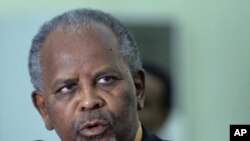Sudan has denied media reports it is blocking South Sudanese oil exports, saying it is only confiscating some shipments as payment of debt claims. A round of African Union mediated talks on oil revenue sharing has ended with an exchange of harsh words.
Senior Sudanese negotiator Sabir Mohamed Hassan contradicted another government official Wednesday who had said that South Sudanese oil shipments had been blocked. Hassan told reporters the Khartoum government would be taking a percentage of South Sudan's exports until Juba agrees to pay transportation charges.
"We have a certain amount of charges and transportation fees that the south should pay to the north, and they refused to pay," said Hassan. "In that case we take value of fees and charges in kind, it will be translated into of barrels of oil, and taken. And that was what was reported in the media as we stopped the export of oil."
Calculating oil revenue shares
Sudan's Petroleum Ministry Secretary General Awad A. Mohamed later explained that the amount being taken is roughly 23 percent of Southern Sudan's total oil export revenue, or about $150 million a month. He said the amount is in line with a recommendation made by an African Union mediation panel.
But South Sudan's chief negotiator Pagan Amum called the fees “extortion." Speaking to reporters at the end of a bruising round of talks, Amum said withholding oil revenue amounts to an act of war.
"Now it is clear the government of Sudan in Khartoum wants to extort the wealth and money of the people of Southern Sudan. They are showing a bullying attitude. They are threatening the people of South Sudan with war, with the stoppage of oil and they have come now with what they call a commercial arrangement. It is nothing commercial. It is pure extortion," said Amum.
Amum also criticized the Khartoum government for refusing an offer of $5.6 billion in compensation for losses Sudan incurred when the south broke away in July. The north has argued the figure should be much higher. The south's amount took three quarters of the total oil production revenue of about 500-thousand barrels per day when it became independent.
Fears of renewed conflict
Amum told reporters the tone of the talks had raised the prospect that the north and south, which fought a long civil war, might again be plunged into conflict.
"We don't know what is going to come. The government of Sudan has rejected our assistance to them. They have rejected our offer of peaceful relations and cooperation. They're threatening to shut down our oil, to block our oil. What we are saying is that we will tell our people the truth that this is what is happening, be prepared for what they may do. It is not necessarily be war, but it may be a shutdown," said Amum.
Officials said another round of oil revenue sharing talks is set for December 20th. The talks are being mediated by an African Union high-level panel led by former South African president Thabo Mbeki.
Sudan Denies Blocking South Sudanese Oil Exports




